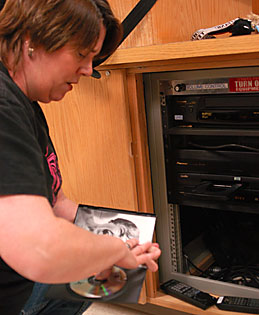 |
|
DEREKH FROUDE/Arizona Daily Wildcat
|
Associate English Professor Susan White fiddles with the audio/video equipment in Harvill 204 yesterday afternoon for her 400-level English class.
|
|
By Bob Purvis
Arizona Daily Wildcat
Friday April 25, 2003
Summer classes will show professors how to use equipment
With a blue "No signal" sign looming on the screen behind her head, a nervous professor turns to a switchboard in the front of the class and clumsily tackles the buttons. As the lights in the room turn off and on, her students start to chuckle.
Eventually, a student comes to the front of the class, and with the touch of a few buttons, makes the intended image appear on the screen. Fifteen minutes later, the professor resumes her lecture.
Employees at the Computing Technology Center hope to make such a scene a thing of the past by training faculty in summer certification courses designed to familiarize them with the advanced technology available in newer classrooms.
"Students are beginning to say, ╬Faculty need more training in how they use this stuff,'" said University Teaching Center Associate Director Beth Harrison.
Harrison said that although more teachers are comfortable with basic classroom devices, such as Elmo video projectors, a number of "classroom emergencies" like the one described above result from the lack of training.
The summer classes will focus primarily on developing interactive Web sites and incorporating video and other class content with the Web site. However, they won't teach faculty how to do things like turn on a VCR.
Some students said professors should receive training for those latter skills before increasing their technological knowledge.
"Some professors just don't use it. They use the more traditional things like overhead projectors or they ask a student to fix a problem," said Nihir Sheth, computer science sophomore.
Other students said they hope the classes will allow professors to utilize expensive equipment that often goes unused because the teachers don't know how to use it.
"I've had several classes in the Integrated Learning Center that were technology-oriented classes where the teachers just don't have the know-how," said Aaron Cowman, a journalism senior. "I know the technology is there to do amazing things; they just don't know how to use it."
Harrison said technological advancements have left many teachers behind in the age of chalkboards and manually operated slide shows. Harrison said many teachers find it intimidating to make the leap to the high tech classroom.
"Both learning how to use this stuff and the prep time involved with using it requires changing the way you teach," Harrison said.
Steve Johnson, computer education program development specialist, said the course will allow faculty to move their classes online over the summer. Johnson said that although the classes do not teach simpler technological issues like how to use new video chalkboards, they are willing to cater to teachers' wants.
"If there is a need for that, we would be more than happy to provide it," Johnson said.
To date, more than 170 individuals have taken advantage of the classes, which are usually paid for with federal workforce grants.
Next fall will also be the first semester in which students can earn credit as technology preceptors by helping teachers to implement some of the new technology.
"Workshops alone won't solve the problem," Harrison said. "With the preceptors, they have somebody to take some of the weight off of their shoulders."
Harrison said that although faculty is improving, and the amount of human error in the classroom is leveling with the amount of equipment error, teachers should still take advantage of these courses.
For more information, including costs and class times, contact the Computing Technology Center at 626-5091.

